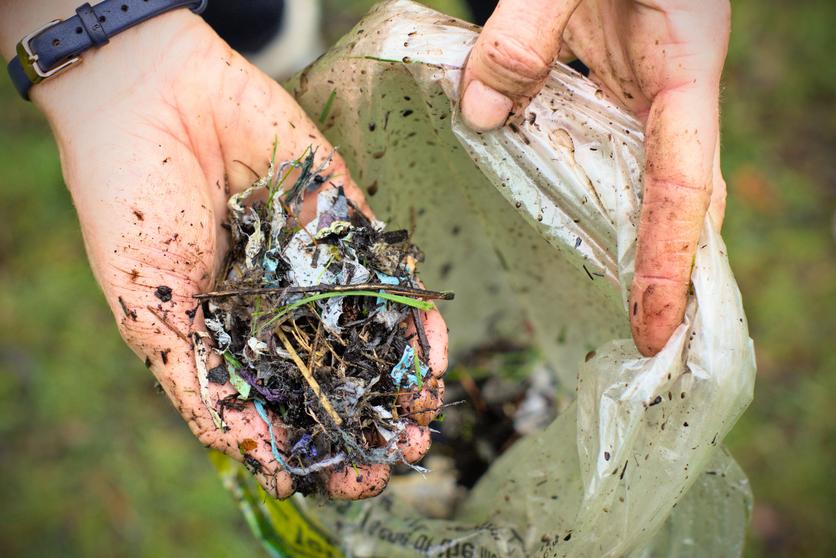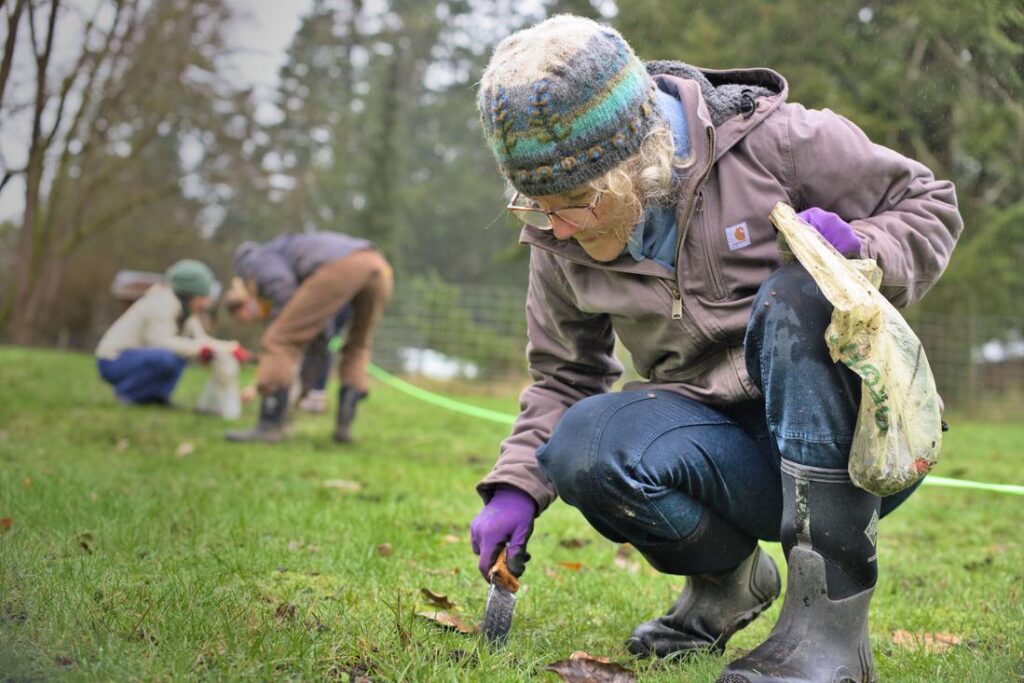By Renée Marceau
Photos accompanying this article are by Julian Dahl. Used with permission.
It’s the beginning of February, and winter storms have passed, blowing a tarp into one of our pastures. I jump the fence to retrieve it. As I walk across the field, with small green sprouts of fresh grass coming up, I notice a color that doesn’t belong there in the dirt: blue, then red, then white. I stop. Upon closer inspection, I realize these are bits of plastic.
My mind whirls in confusion. I think back to the fall. After years of discussion, my husband and I finally invested in reseeding our sheep pastures in an effort to bring our over-grazed fields back to vibrant health and nutrition for the soil and the sheep. We purchased 20 yards of organic compost and grass seed and spread it out over two acres last September. Now, as I’m looking over our fields at beautiful, new grass, I realize: we’ve littered our pastures with garbage – small micro-pieces of plastic.
What?! How could this happen when I’ve purchased organic compost? I immediately went to where I purchased the compost to demand an explanation. I learned that this compost was most likely purchased from Cascade Compost or Land Recovery Inc (LRI) in Pierce County. But it doesn’t really matter. I learned that all the food and yard waste programs in King and Pierce counties will most likely have plastic and other non-organic material in the compost. Very few Washington state facilities produce “certified organic” compost. Most often “organic” just means it’s made of organic, natural material.
As a consumer, this is frustrating. It’s obvious it’s made of organic material, so why label it as such unless it’s actually certified?
When I pressed the seller as to why they don’t just stop carrying it – because it’s obviously unethical to be selling compost as organic when it’s filled with plastics – the response was that they would no longer be in business. At least half of their income comes from selling this organic compost to Vashon residents.
It seems rather appalling that a business would respond in this way, but is this really that unusual? Maybe for smaller business in a small community, where reputation is worth gold. But the reality is this is “business as usual” in our current state of commerce – few companies in the supply chain will walk away when business practices are unethical because they have a business to run, a mortgage to pay, a family to feed, etc. So where does the buck stop? Where does the accountability land in this situation?
I needed an immediate remedy, and the seller was obviously not going to offer to be part of it. They pointed out that I had the opportunity to refuse it, but instead I purchased it. On one hand, this is true. On the other, I was not given all the information needed to make an informed decision. But in line with “business as usual” practices, sellers often do not give all the information to potential customers. Unfortunately, again, this situation is not unusual. And I wasn’t going to argue with the person and create controversy. I could see the issue was much bigger, and I needed an immediate remedy.
So, I put out a call for help to my personal community. If folks came out to do a “pasture pick-up” for a few hours one Saturday, I’d feed them lunch. This turned out to be rewarding on multiple fronts: it got over three gallons of micro plastic off the pastures, preventing it from being ingested by sheep or landing on garden beds; it generated renewal of community through adversity; it led to discussions of the underlying issues, and how to approach creating a remedy; it led to shared education on the pervasiveness of micro-plastics in many aspects of our lives; and it produced ideas on how to make our own compost, and motivation to change consumer habits to reduce the purchase of plastic. THIS is the type of activity that will begin to move mountains and support where true accountability lies – in the individual.
A longer-term remedy is to educate folks, which is why I’m writing this article. You, my fellow Vashon neighbors, need to know that what’s being sold as “organic” compost may not be organic and instead contain non-organic material. It’s really up to each of us to educate ourselves by asking good questions, seeking answers, and using our money to speak for our values – even when its inconvenient.
Link to the timelapse video of the field clean up described in this article.
Visit Zero Waste Vashon for educational material and an update on their ongoing work to create a compost facility for household and yard waste on Vashon. See: https://zerowastevashon.org/.
Links to Resources about Plastics
PODCASTS
WISE TRADITIONS PODCAST — EPISODE 260
Life in Plastic…NOT Fantastic with Dr. Anthony Jay
ARTICLES
Wise Traditions (publication), Vol 23, No 4
“Living in the “Plasticene”: The Plastic Age” by Anthony Jay, PhD


